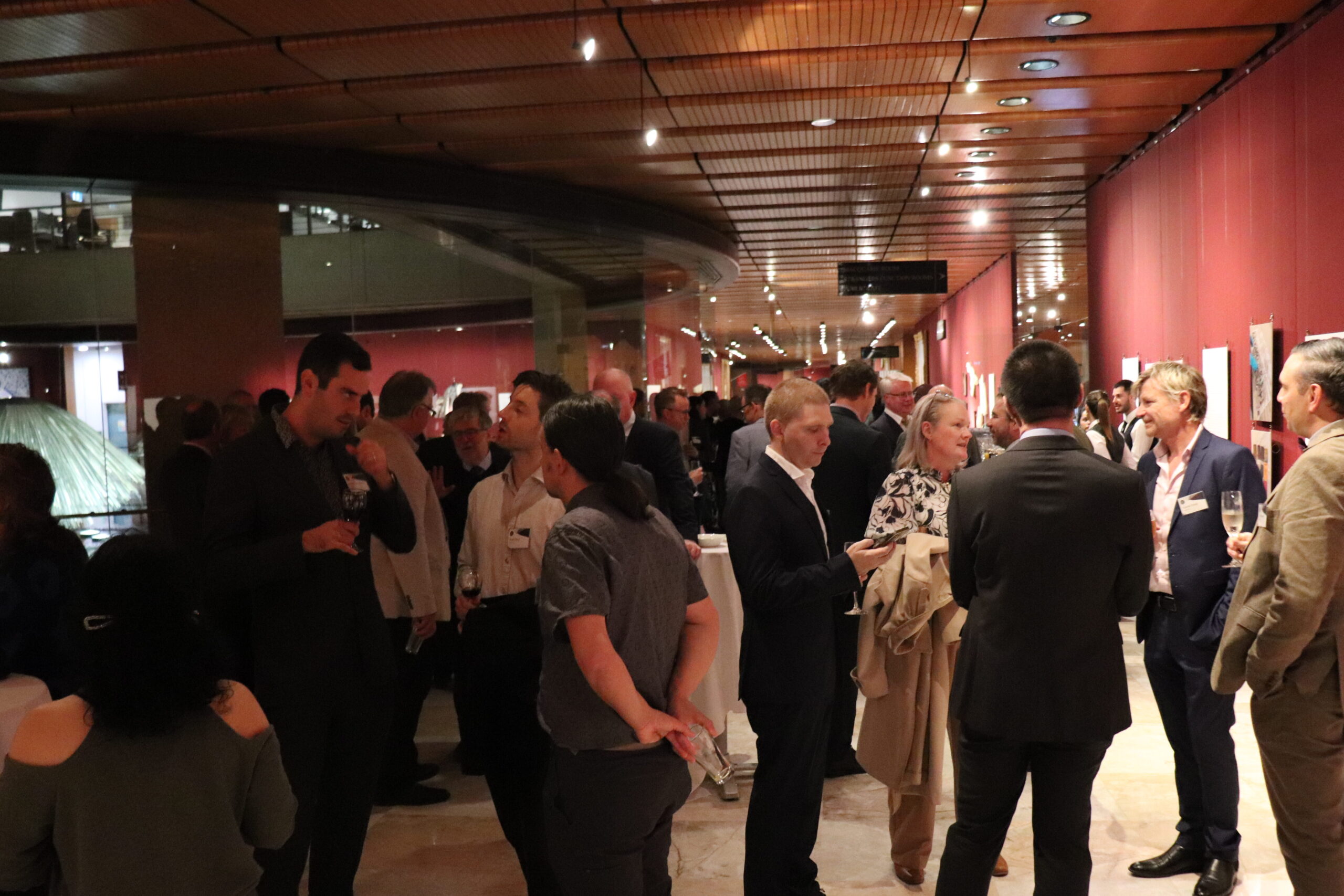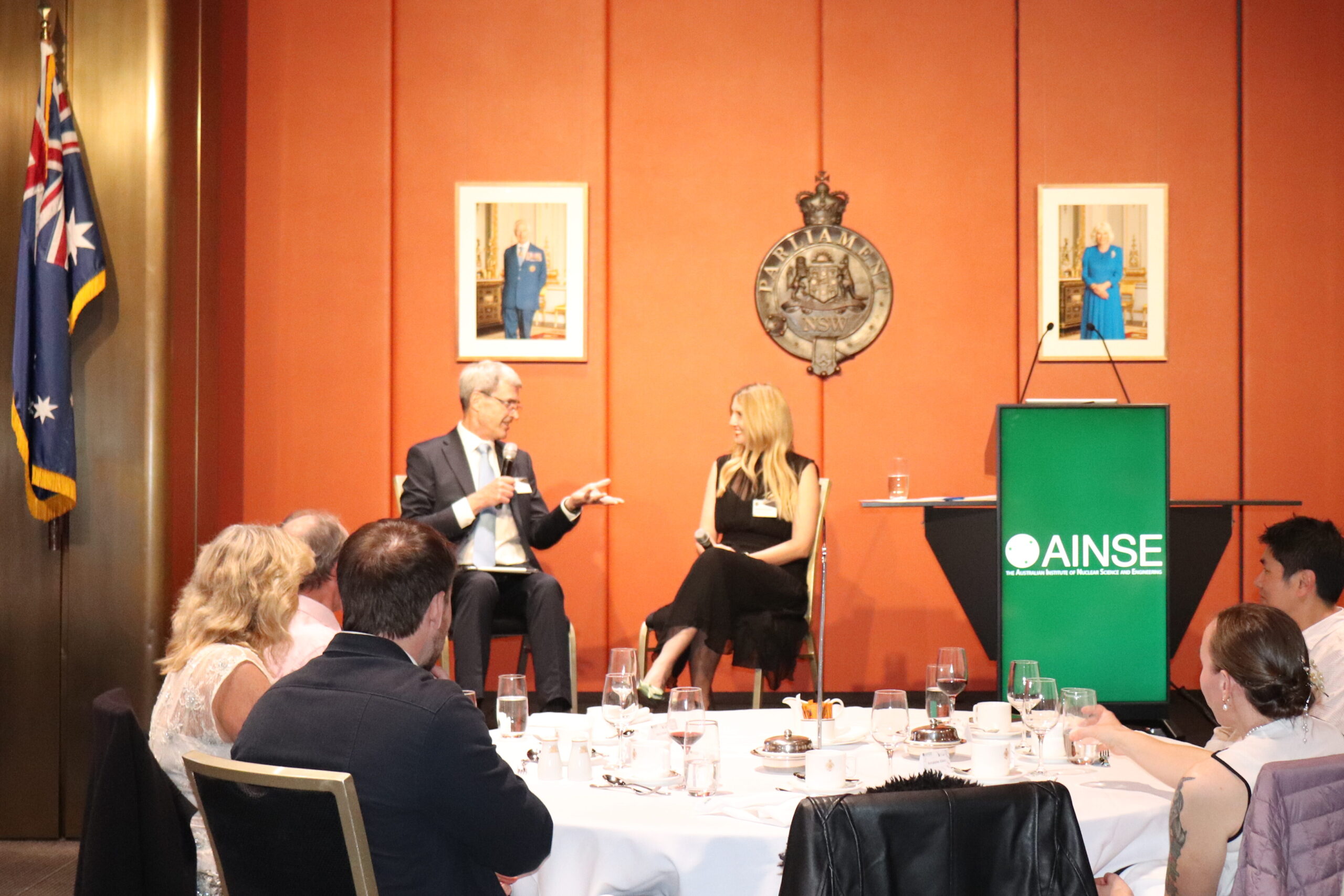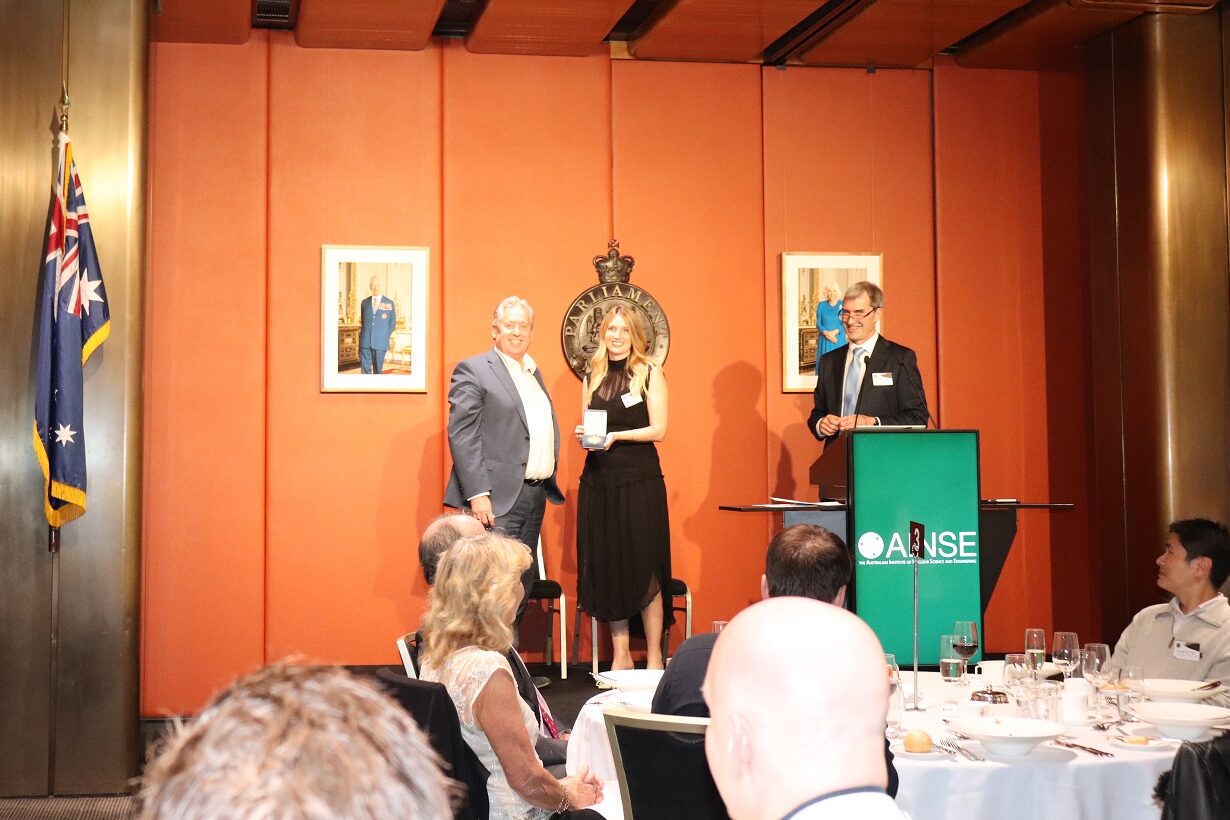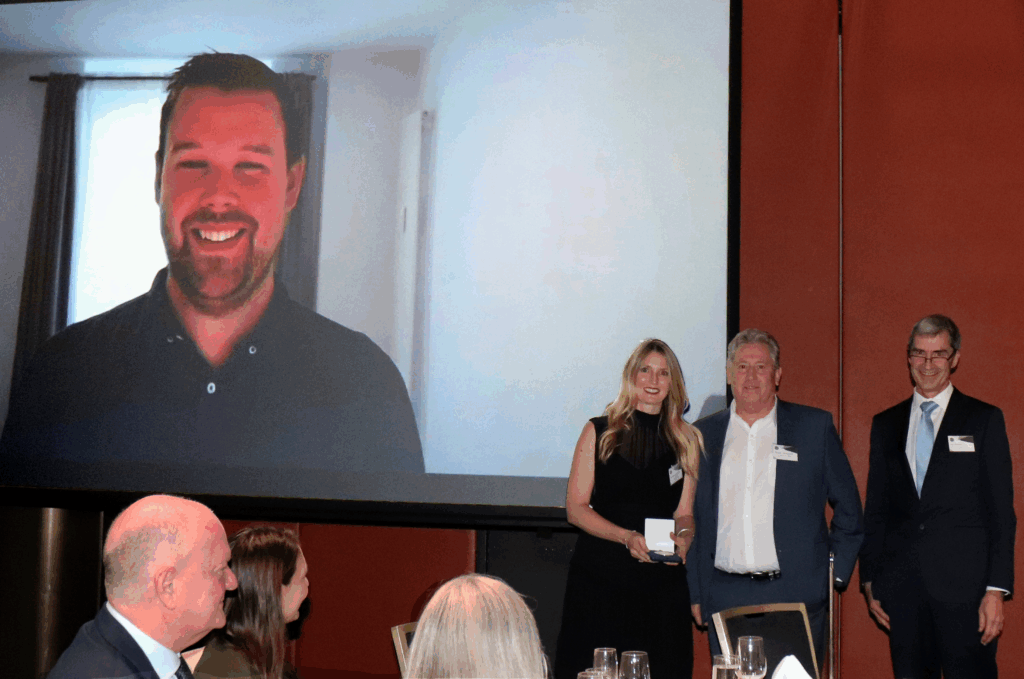On Tuesday 20th May 2025, our annual AINSE Networking Dinner was hosted at NSW Parliament House to bring together representatives from across the Australasian nuclear science and technology sector. As part of this event, AINSE Scholar Gold Medals for excellence and impact in research were formally awarded to:
- Dr. Rebecca Duncan, former AINSE PGRA scholar from 2020 until the completion of her PhD in 2024 at the University of Technology Sydney; and
- Dr. Hayden Robertson, former AINSE PGRA Scholar from 2020 until the completion of his PhD in 2024 at The University of Newcastle.
Read more about Rebecca’s and Hayden’s research successes below.
Dr. Rebecca Duncan was in attendance with her family at NSW Parliament House, while Dr. Hayden Robertson joined the ceremony via video link from Germany.
AINSE President Prof. Ian Gentle and ANSTO CEO Shaun Jenkinson formally presented the medals to Dr. Duncan and Dr. Robertson in front of assembled guests, which included members of the AINSE and ANSTO Boards, university PVCs, DVCRs, and AINSE member representatives from across Australia and New Zealand, representatives from the Embassy of France in Australia, Science and Technology Australia (STA), the Australian Radioactive Waste Agency (ARWA), the Australian Radiation Protection and Nuclear Safety Agency (ARPANSA), the Sydney West Radiation Oncology Network, Women in Nuclear (WiN) Australia, and the Australian Young Generation in Nuclear (AusYGN), alongside AINSE scholars and their ANSTO research supervisors.

After the medal presentations, Dr. Robertson and Dr. Duncan shared the stories of their AINSE-supported research with the assembled guests over dinner, through a short presentation and an extended conversation with Prof. Ian Gentle.
Beyond acknowledging the fantastic research contributions of our newest Scholar Gold Medallists, the annual AINSE Networking Dinner provided a unique opportunity for connections and discussions among distinguished representatives from across the vast majority of Australasian nuclear science and technology sector.
Throughout the evening, select AINSE Member Representatives were acknowledged for their outstanding service to AINSE over the part 12 months, particularly for their assistance in engaging Australian and New Zealand students with AINSE scholarships and education programs. Awards were presented to:
- Prof. Gary Bryant – RMIT University
- A/Prof. Vladimir Golovko – University of Canterbury
- Dr. Rezwanul Haque – University of the Sunshine Coast
- A/Prof. Ivan Kempson – University of South Australia
- Prof. Chris McNeill – Monash University
- A/Prof. Amy Prendergast – The University of Melbourne
- Dr. Aaron Seeber – CSIRO
- Prof. Chris Sumby – The University of Adelaide
- Dr. Grant van Riessen – La Trobe University
AINSE Managing Director Michelle Durant celebrated the success of the annual AINSE Networking dinner in 2025 and looked forward to continuing conversations and connections between AINSE and organisations within the nuclear science and technology sector.
‘The evening was a great opportunity to highlight the success of AINSE scholars, the diversity of research areas, as well as bringing the nuclear science and technology community together for valuable networking.’
Nominations for 2025 AINSE Scholar Gold Medals will be received until 31st August 2025.

Dr. Rebecca Duncan: How climate change is impacting the marine polar food web
Polar regions are the most rapidly changing environments on the planet, with global warming destabilising these unique and essential ecosystems at an accelerated rate.
Dr Rebecca Duncan’s research investigated how the changing polar ocean conditions, such as a decline in sea ice extent and ocean acidification, affect the biomolecular content and community composition of polar microalgae. This is particularly important as phytoplankton and sea ice algae are crucial as they form the base of the polar marine food web, supplying energy to marine life and shaping ocean biogeochemical dynamics.
During her PhD, Rebecca undertook three extensive field campaigns in the Arctic, where she obtained sea ice microalgae from variable ice conditions, and performed an in-depth analysis on Antarctic phytoplankton exposed to ocean acidification. Central to this work was the use of synchrotron-based Fourier Transform Infra-red (s-FTIR) microspectroscopy at ANSTO’s Australian Synchrotron.
Dr. Duncan’s research will improve our accuracy for predicting and measuring environmental changes due to climate and local factors, and will enhances estimates of fisheries catches and sustainability in Arctic and Antarctic systems.
In addition to her research, Rebecca has been an active advocate for Women in STEM, in particular Women in Polar Science. She is currently a Science and Technology Australia Superstar of STEM, using this high-profile platform to elevate the public visibility of women and non-binary people in STEM and increase awareness about the barriers facing women conducting polar and other field-related research.

Dr. Hayden Robertson: Advancing soft matter interfaces using polymer brushes and neutron reflectometry
Understanding the interplay between solvents, substrates, and solutes is crucial for a wide range of applications involving macromolecules (e.g., polymers, proteins). This includes their active manipulation in situ by harnessing a range of responsive behaviours, including tuning via pH-, temperature and/or ionic strength.
Polymer brushes present an innovative platform for understanding complex physicochemical phenomena. Hayden’s Ph.D. research investigated the interactions between solvents, salts and polymer brush coatings in complex media using state-of-the-art interfacial reflection techniques, conducted in large part at ANSTO’s Australian Centre for Neutron Scattering (ACNS).
Hayden’s research provided significant insights into enhancing the performance and application of responsive polymer coatings. In addition, Hayden’s extensive collaboration with Dr Andrew Nelson (ANSTO) and Dr Isaac Gresham (The University of Sydney) has advanced the methodologies of neutron reflectometry; in particular, Hayden has delivered software for the co-refinement of ellipsometry, neutron and x-ray reflection data that allows far more accurate modelling of diffuse interfaces, such as polymer brushes, and more rapid analysis of challenging soft matter interfacial reflection data.
Hayden is currently a postdoc at the Technische Universität Darmstadt (Germany) in the renowned Soft Matter at Interfaces group of Prof. von Klitzing where he continues to develop his neutron and X-ray scattering expertise on polymers at interfaces.

Nominations for 2025 AINSE Scholar Gold Medals will be received until 31st August 2025.
